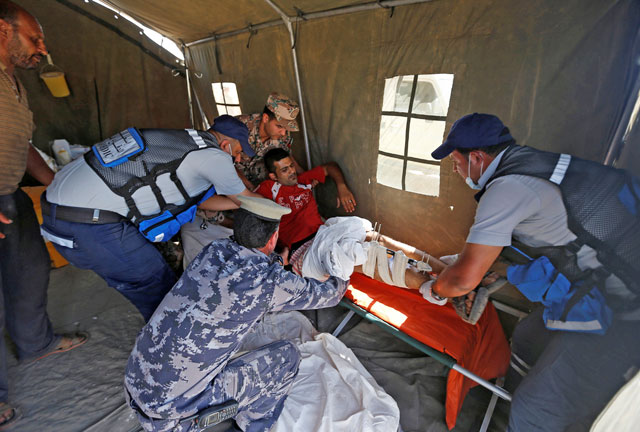Beirut/UNITED NATIONS — Syrian rebels said on Wednesday that talks with regime ally Russia over the country's south had collapsed after Moscow threatened a renewed military offensive if they did not agree to tough surrender terms, Agence France-Presse reported.
Russia has been backing a two-week offensive by Syrian President Bashar Assad's forces against rebels in the southern provinces of Daraa and Quneitra.
But it is simultaneously brokering talks with rebel towns for negotiated surrenders in a carrot-and-stick strategy that Russia and the regime have successfully used in the past.
Russian air strikes against insurgents in southwest Syria have resumed, according to residents and a war monitor, after the talks failed, Reuters reported.
The air strikes targeted the towns of Tafas, northwest of the provincial capital Daraa, and Saida, to its east, said the Syrian Observatory for Human Rights, according to Reuters.
More than 30 towns have already agreed to return to regime control and talks were focused on remaining rebel territory in Daraa’s western countryside and the southern half of the city.
Rebels met with a Russian delegation on Wednesday afternoon to deliver their decision on Moscow’s proposal for a regime takeover of the rest of the south.
About 90 minutes after the meeting was set to begin, the joint rebel command for the south announced the talks had “failed”, AFP reported.
“Negotiations with the Russian enemy in Busra Al Sham have failed, after they insisted on the surrender of heavy weapons,” the command said in an online statement.
Their spokesman Ibrahim Jabbawi said the talks had not produced “any results” because Moscow had insisted rebels hand over their heavy-duty arms in one go.
“The session ended. No future meetings have been set,” Jabbawi told AFP.
A source close to the talks said rebels would be willing to hand over heavy weapons in multiple phases.
‘Final answer’?
The meeting followed an hours-long session on Tuesday, in which rebels proposed the army’s withdrawal from recaptured towns and safe passage to opposition territory elsewhere for fighters or civilians unwilling to live under regime control.
But Moscow had roundly rejected the terms, the source said, according to AFP, and responded with a counter-proposal.
It told negotiators population transfers were not on the table in the south, although it had agreed to them in other areas like Eastern Ghouta and Aleppo.
Russia insisted the army would return to its pre-2011 positions, and local police would take over towns in coordination with Russian military police.
The source had said before Wednesday’s meeting that the rebels were expected to give their “final answer”.
“Today will be the last round — either the rebels agree to these terms, or the military operations resume,” the source said, as reported by Agence France-Presse.
The observatory, a Britain-based war monitor, said air strikes had stopped for several days to allow for negotiations.
There were no immediate reports of a resumption of bombing or other hostilities after the collapse of the talks.
Moscow has used tough deadlines in the past with rebels but has sometimes extended them.
That blend of military pressure and negotiated surrenders has expanded the regime’s control of Daraa province to around 60 per cent — double what it held when it began operations on June 19 according to AFP.
The violence has displaced between 270,000 and 330,000 people, according to the UN, many south to the border with Jordan or west near the Israeli-occupied Golan Heights.
Both countries have kept their borders closed despite mounting calls by rights groups to let Syrians escape to safety.
On Wednesday, Human Rights Watch demanded both Jordan and Israel allow asylum-seekers in, AFP reported.
‘Drop their arms’
Some displaced families whose hometowns had fallen back under regime control have been returning, but even that journey is dangerous.
Eleven members of a single family were killed overnight in a land mine blast as they returned to Al Mseifra, which had “reconciled” with the government, the observatory said on Wednesday, as reported by AFP.
More than 140 civilians have died since the assault began.
World powers have criticised the operation for violating a ceasefire announced last year by Washington, Amman and Moscow, but they have not managed to halt the blitz.
The United Nations Security Council will hold a closed-door emergency meeting on Thursday on the offensive, AFP reported.
Sweden, which holds the rotating Security Council presidency, requested the closed-door meeting along with Kuwait, Swedish diplomats said on Tuesday.
For Thursday’s meeting, the UN Office for the Coordination of Humanitarian Affairs will report to the 15 Council members about the humanitarian situation in Daraa.
The increased violence “indicates yet another failure by the parties of the conflict to protect civilians and civilian infrastructure”, Sweden’s UN mission said, according to AFP.
“Efforts must be intensified to de-escalate violence, also to enable the UN cross-border convoy from Jordan that is on standby at the border to deploy as soon as possible.”
Residents and displaced Daraa natives gathered in front of UN offices in a rebel-held town in Quneitra province to protest global inaction.
“Civilians who fled and ended up living in tents or without tents out in the open organised this protest in front of the UN offices to ask the United Nations and the world for protection and international guarantees for their lives,” said Ali Salhadi, an opposition official, as reported by AFP.
Jordanian Foreign Minister Ayman Safadi was in Moscow on Wednesday for talks with his Russian counterpart Sergey Lavrov.
Safadi called for a ceasefire in the south, saying the developing situation was of “great importance” to Jordan, AFP reported.
Lavrov, meanwhile, said Moscow was helping Syria’s army “convince” rebels to lay down their arms.
